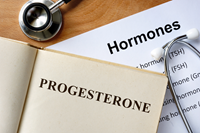Menopause Or Menopause Transition: When Does The Biology Begin?
Does menopause really begin only after a woman experiences her last menstrual period? On average, the age of these women is 51 years. But ask any woman in menopause how she recalls the three to five years before she reached that milestone and most will remember that their menstrual cycles became more erratic and unpredictable. We now know that other biological changes also are beginning to occur.
The official statement of the North American Menopause Society (2012) marks the Menopause transition as a several-year window. It begins with early perimenopause of variable length signaled by fluctuating follicle stimulating hormone (FSH) levels as declining estrogens from the ovaries fail to produce a negative feedback to the brain. A late perimenopause of one to three years is marked by consistently rising FSH levels as estrogen levels fall further, followed by early menopause which lasts for two to six years during which FSH levels stabilize at a high level into late menopause. But what has this to do with the many symptoms that women experience in this chapter of their lives? For those answers, we must examine the critical relationship that exists between estrogen and inflammation.
In the reproductive years, estradiol, 95% of which is produced by the ovaries, functions as the most powerful estrogen. It was always respected for its role in pregnancy and menstrual cycling. Yet, more recently, scientists have shown that during those years estradiol also serves to suppress production of critical inflammatory proteins such as interleukin 1 (IL-1), interleukin 6 (IL-6) and tumor necrosis factor alpha (TNF a), which are normally generated by monocytes, macrophages, neutrophils, and other cell populations. These inflammatory proteins, when expressed, are capable of stimulating over 60 other inflammatory proteins that we now recognize attack brain, bone, heart, skin, and blood vessels. The appearance of these inflammatory proteins parallels the fluctuating and then rapidly declining estrogen levels seen in late perimenopause.
Women may recognize this period of their lives only by the onset of irregular menstrual periods. Yet it is during this window of time that estrogen levels fluctuate and even may increase briefly before beginning to decline permanently. It is also a time when some women for the first time begin to experience transient hot flashes, mood disorders, vaginal dryness, or sleep disorders.
From clinical studies, scientists also have shown that during the three to five years leading up to the last menstrual period, visceral fat that surrounds our abdominal organs and coats our blood vessels increases to a greater degree than does subcutaneous fat. These specialized fat cells act as tiny factories to produce a wide range of inflammatory proteins. These changes are accompanied by a rise in blood lipid levels and increases in blood vessel wall thickness. These cardiovascular events, while perhaps not generating the emotional reaction of many of the other perimenopausal symptoms, signal the real risk in menopause, that of a cardiovascular event and even stroke.
As scientists continue to clarify the biology of the menopause transition, they will offer clinicians and their patients education and novel approaches to accommodate this most natural time in life.
By James Woods, M.D.
Dr. Woods treats patients for menopause at the Hess/Woods Gynecology Practice.
Disclaimer: The information included on this site is for general educational purposes only. It is neither intended nor implied to be a substitute for or form of patient specific medical advice and cannot be used for clinical management of specific patients. Our responses to questions submitted are based solely on information provided by the submitting institution. No information has been obtained from any actual patient, and no physician‐patient relationship is intended or implied by our response. This site is for general information purposes only. Practitioners seeking guidance regarding the management of any actual patient should consult with another practitioner willing and able to provide patient specific advice. Our response should also not be relied upon for legal defense, and does not imply any agreement on our part to act in a legal defense capacity.
James Woods | 1/19/2015



